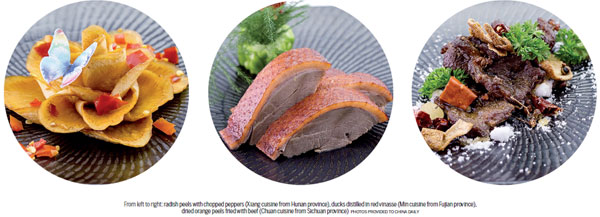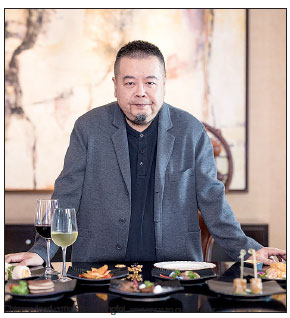Shen's daring culinary endeavor


Famous food critic tosses the rulebook out the window in culinary collaboration with Sheraton hotels.
In a bid to introduce the beauty of China's eight famed cuisines to foreign travelers, Chinese celebrity food critic Shen Hongfei was willing to adopt a somewhat paradoxical move - abandon the cornerstones of what makes the cuisine great in the first place.
The 54-year-old had partnered American hospitality brand Sheraton to create a special menu at the latter's 75 outlets in China. The menu, titled Paired, was launched in November and is available at the lobby bar of every Sheraton hotel.
"Sheraton is definitely not the first, and unlikely the last, western hospitality brand trying to popularize Chinese cuisine among its western clientele. But what I want to achieve is actually making a difference to the long undervalued cuisine," said Shen.
The trick to appealing to foreign palates not used to the complexity of Chinese food, Shen said, is to simply go against convention by dropping the elements of being local and seasonal.
These two trademark features of Chinese cuisine have been growing in popularity in kitchens around the world due to the rise of the slow food movement, which aims to prevent the disappearance of local food cultures and traditions. But because of the task at hand, Shen said that food trends had to take a back seat.
"It's like learning a language. One has to learn the alphabet before using cyber language," said Shen.
The eight dishes designed by him are: radish peels with chopped peppers (Xiang cuisine from Hunan province), pork skin jellies (Peking cuisine), ducks distilled in red vinasse (Min cuisine from Fujian province), salted roasted chicken (Cantonese cuisine), rice rolls with salted duck egg yolk (Su cuisine from Jiangsu province), spring rolls filled with deboned cod fish (Zhe cuisine from Zhejiang province), dried orange peels fried with beef (Chuan cuisine from Sichuan province), and dried bean curd flavored with tea leaves and spices (Hui cuisine from Anhui province).
Even the presentation style has been altered to suit foreign travelers. Each dish is served in a tapas style that allows people to share the bite-sized portions as Shen believes one of the most intimidating features of Chinese cuisine is its sheer volume and variety.
"People of different nationalities or origins are not only defined by their skin colors, languages, but also the food they eat. I think the eight dishes can basically summarize the taste of Chinese cuisines," said Shen of the menu.
Having started his career in journalism as a political reporter in southern China's Guangdong province, the region that was the first in the country to adopt the opening up and reform policy, Shen began to write about food in 1998 as a columnist for the well-respected Southern Weekly newspaper. Before his retirement late in the 2000s, he was considered the most expensive columnist in the industry, charging as much as 1 US dollar per word.
It was not until 2012, when the seven-episode food documentary series A Bite of China - he was the chief consultant to the show - hit the television screens that he became a household figure. The show drew more than 100 million viewers during its initial broadcast.
An equally successful spin-off to the program was created years later and is believed to have further whetted the appetite of millions of Chinese for their humble hometown snacks. The show was also hailed as a champion of the Chinese food industry that had been embattled by several scandals over the years.
However, Shen believes that there is still a long way to go before Chinese cuisine can achieve as great a recognition as its French counterpart that it is often compared to. He also cited the need for Chinese cuisine, which is renowned for its heavy flavors, to adapt and cater to the growing demand for healthy eating if it is to achieve greater popularity around the world.
"Many young Chinese today would opt for French or western fine dining over Chinese when they want to dine out on important occasions. But they are not the ones to blame. It is the job of chefs and restaurants to attract customers," said Shen.
xujunqian@chinadaily.com.cn
















